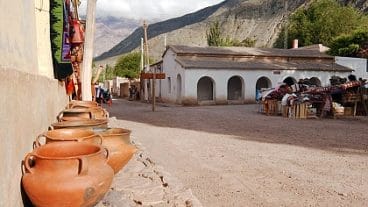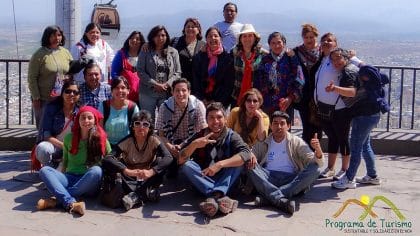 Salta: one of the more beautiful provinces of Argentina, with natural riches and ancient cultures that resisted the Spanish Conquest over 500 years ago. With the arrival of the new millennium it has been upgraded as a destination for tourists and the undisputed centre of the Northwest Region of Argentina. “The Sustainable Tourism Programme was begun in 2010 upon encouragement from the Bishops Commission for Migration and Tourism,” Paula González explains. “The Northwest of Argentina is mainly inhabited by descendants of indigenous peoples. Some live in communities and others are farmers. It demonstrates their connection to the land, both for produce and for artisanal crafts.” The important migrant waves, from Europe, the Middle East and Latin America – especially Bolivia – have created a ‘coexistence of cultures’, with a strong indigenous component that makes this a very unique region with cultural challenges.” The programme was begun in response to the lack of jobs. Only 39% of the economically active population had jobs. “We proposed working in the rural and more remote areas that were most affected,” explains the coordinator. The geography of the region contains wide valleys and rocky highlands (up to above 3000 metres). “We realized that the problem was due mainly to isolation,” continues Paula González, “which prevents them from selling their products, and in some communities there was a lack of water and energy. Those most affected were women and young people.” At that time Argentina was setting up a national tourism development plan that excluded rural communities. Then, the Catholic Church pointed to the need for more equitable and inclusive proposals. The goal was to create new tourist destinations based on agricultural and handicraft production, which are the basis of their livelihood.
Salta: one of the more beautiful provinces of Argentina, with natural riches and ancient cultures that resisted the Spanish Conquest over 500 years ago. With the arrival of the new millennium it has been upgraded as a destination for tourists and the undisputed centre of the Northwest Region of Argentina. “The Sustainable Tourism Programme was begun in 2010 upon encouragement from the Bishops Commission for Migration and Tourism,” Paula González explains. “The Northwest of Argentina is mainly inhabited by descendants of indigenous peoples. Some live in communities and others are farmers. It demonstrates their connection to the land, both for produce and for artisanal crafts.” The important migrant waves, from Europe, the Middle East and Latin America – especially Bolivia – have created a ‘coexistence of cultures’, with a strong indigenous component that makes this a very unique region with cultural challenges.” The programme was begun in response to the lack of jobs. Only 39% of the economically active population had jobs. “We proposed working in the rural and more remote areas that were most affected,” explains the coordinator. The geography of the region contains wide valleys and rocky highlands (up to above 3000 metres). “We realized that the problem was due mainly to isolation,” continues Paula González, “which prevents them from selling their products, and in some communities there was a lack of water and energy. Those most affected were women and young people.” At that time Argentina was setting up a national tourism development plan that excluded rural communities. Then, the Catholic Church pointed to the need for more equitable and inclusive proposals. The goal was to create new tourist destinations based on agricultural and handicraft production, which are the basis of their livelihood.  “The first year, we identified 30 communities and 7 key areas for development in 5 Provinces. Currently, almost 6 years later we are working in 5 areas. There are around fifty entrepreneurs linked to the ‘Network of Tourism Entrepreneurs (NOA)’. If we were to highlight anything it would be the network of organisations that have joined forces to work together in a structured way – national, provincial and local. They include universities, NGOs and businesses. They have also been closely connected to the Economy of Communion and the Movement for Unity in Politics that are key allies. Over these years,” Paula concludes, “what gave strength and effectiveness to the development of the project was the work done on the links in the chain of values and relationships that were formed between all the people involved.” We have already come a long way. There are local projects, new leaders capable of carrying things forward, and we can already foresee very satisfactory results: for example, interaction and mutual cooperation amongst different communities that are stepping out of their anonymity and becoming generators of their own history. For more information: Website Video
“The first year, we identified 30 communities and 7 key areas for development in 5 Provinces. Currently, almost 6 years later we are working in 5 areas. There are around fifty entrepreneurs linked to the ‘Network of Tourism Entrepreneurs (NOA)’. If we were to highlight anything it would be the network of organisations that have joined forces to work together in a structured way – national, provincial and local. They include universities, NGOs and businesses. They have also been closely connected to the Economy of Communion and the Movement for Unity in Politics that are key allies. Over these years,” Paula concludes, “what gave strength and effectiveness to the development of the project was the work done on the links in the chain of values and relationships that were formed between all the people involved.” We have already come a long way. There are local projects, new leaders capable of carrying things forward, and we can already foresee very satisfactory results: for example, interaction and mutual cooperation amongst different communities that are stepping out of their anonymity and becoming generators of their own history. For more information: Website Video
Put love into practice
Put love into practice




0 Comments